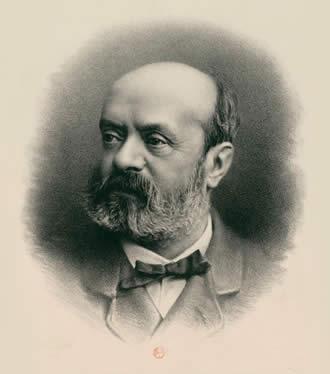

Theodore Aubanel, brother of Charles and Joseph, was born in Avignon on March 26, 1829, at n°21 rue St Marc, a street which no longer exists since the opening of the rue de la Republique. Theodore Aubanel In this house, his grandfather had founded a printing and publishing house, which his son Laurant, the father of Theodore, continued.
Le Félibre
He is one of the founders of the Felibrige. On May 21, 1854, seven young poets : Theodore Aubanel, Jean Brunet, Paul Giera, Anselme Mathieu, Frederic Mistral, Joseph Roumanille et Alphonse Tavan began the literary renaissance of the langue d'Oc (the provencal language) and take the title of "felibres". Mistral named the assembly thus in reference to the 7 felibres (doctors) of Law, invoked in a Provencal song. The act takes place in Font-Segugne (near Chateauneuf-de-Gadagne, 9 kilometers from Avignon),in the chateau of Paul Giera.
Following the tradition of the French literary masters, from Lamartine to Mallarme, Theodore wrote three collections of lyric poems, La Grenade entr'ouverte, Les Filles d'Avignon, Le Soleil d'Outre-Tombe et, and three plays, Le Pain du Peche, Le Rapt, Le Pâtre. As a lyric poet, Theodore restored the troubadour tradition and as a dramatic author, he has the somber grandeur belonging to Eschyle. In a letter to Pierre Louÿs, Paul Valery calls him "the only true Provencal poet".
Theodore had an ardent, enthousiastic, passionate nature.He was charmed by a thin, young brunette, known for her grace and her beauty, Zani (Jenny Manivet), whom he met in Font-Segugne. However, after three years of a shared, yet chaste love, she responded to a higher calling, and left for the Far East in the service of God and the poor. The young man gave into this decision, but his deeply wounded heart never recovered. Neither his travels, nor his overwhelming activity, nor even time could erase this cherished memory which inspired the most beautiful verses, notedly the despairing poem La Mióugrano entreduberto(1860). Theodore's glory overshadowed the other founders of the Felibrige movement. One of them, Joseph Roumanille, initiator of the movement, denounced him to the archbishop as an author of pernicious books.The poet, ordered to burn his poems, obeyed.
He died of apoplexy, at the age 57, during a period of creative output, knifed in the back by "friends" more concerned with eliminating a rival than adding to the enrichment of Provencal literature with new works.
The Printing Works
United by a strong affection, Theodore et Charles, who were associated for the businesse, had nothing in common but their highly-tuned business sense. Joseph, the oldest brother, dedicated himself to art and created a name for himself as a painter. He collaborated with the publishing house as a charming illustrator in the romantic style.
Under the two brothers administration, the company continued to develop. The greatness which both one and the other enjoyed attracted mant visitors and created serious relationships with some of the most illustrious celebrities of their time.
Theodore befriended Stephane Mallarme. During his stay in Tournon, Mallarme came to spend his vacation in Avignon in August, 1864 and was seduced by the cordiality of the felibres.The two poets maintained a regular correspondance. They shared and criticized each other's works. Theodore admired his friend's poemes for the splendor of the images and the harmony of the strophes ; but the need for clarity, springing from his Latin temperament, caused him to regret the excessive obscurity. These divergences of view had, at times, some humorous consequences. Mallarme rooted himself more and more in his hermit-like style and cleverly hid the meaning of his verses under an even more impenetrable symbolism, whenever his correspondant happened to uncover them too easily.
Theodore had epistolary relations, as well, with one of our greatest dramatic poets. Curious letters that we cannot read without melancoly. Lamartine, at that time, battled the financial worries which darkened the end of his life. His pen, from which sprang so much inspired work, was obliged to put itself to more prosaic tasks to ensure an existence worthy of his genius and his name. He wrote a literature course, and to ensure the success, he asked the Aubanels to lend him their commercial backing. Theodore et Charles had profitted from the prosperous period which France enjoyed under the second Empire. When they died, their firm had warehouses and representatives in all of Europe. Each generation had brought his contribution to its hereditary task.
Where to sleep?
Maison Chenet, Entre Vigne et Garrigue
165 EUR/night*
Bed and breakfast - Avignon and the surroundings